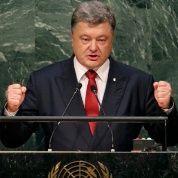Many are saying Sunday’s elections in Ukraine, as well as those to be held in coming weeks, will act as a referendum on President Poroshenko's rule and the Minsk agreements.

Although a truce between Kiev and pro-Russian rebels is holding on, rebel forces have decided to postpone local elections in areas they control until February 2016, a move welcomed by President Petro Poroshenko's administration and in accordance with the Minsk agreements.
Despite the nature of the elections, municipal concerns – such as local water or electricity systems, infrastructure or education – have not played much a role in the debate.
Pressure to Move Right
The political discourse within Kiev-controlled Ukraine is less than inspiring. With far-right movements financed by oligarchs gaining ground, the main tone of the campaign has become whether or not President Poroshenko is governing sufficiently to the right.
This polarizing perspective has led to the rise in popularity of nationalist and far-right sentiments, to the point that some parties are rejecting the Minsk agreements all together.
With a crippled economy, austerity measures demanded by international lenders and the conflict with rebel forces in the east still unresolved, disillusionment prevails among the population.
Most people regard Prime Minister Arseniy Yatsenyuk as the chief protector of oligarchs within the Poroshenko administration. This has resulted in his party – the People's Front – having to pull out all together from the local elections, not registering a single candidate.
However, President Poroshenko is also regarded as incapable of resolving the ongoing conflict with the rebels in the east or fixing the economy.
This scenario sows doubt about the future of Kiev's rule as it could change the current alliances and drift the country's political consensus further right.
Still, the governing Solidarity Bloc alliance is expected to win a majority of local governments, including in the capital.
Ukrainians will elect 10,000 mayors and 160,000 local council members in a new electoral system, based on a majority vote, with newly created administrative units.
At least 132 different political parties are participating, seeking to gain some of the thousands of eligible posts, which creates significant chaos in the political landscape.
Some parties have used names of old political parties to confuse voters, others are hiding their donors.
The most radical political players have formed a new coalition, the 'Dill' party – a derogatory term used for Ukrainians – as a “patriotic” alliance, joining forces with the radical nationalist Right Sector.
According to a recent opinion poll by the International Foundation for Electoral Systems, the Right Sector has 3.1 percent support. Although this is a small percentage it reflects growth: previously, the Right Sector did not have a structured party. It still does not hold any elected posts.
All About Oligarchs
The Dill party is headed by oligarch Ihor Kolomoisky, infamous for running man-hunts in East Ukraine through his personally bankrolled militia. The oligarch was fired as governor of the eastern city of Dnepropetrovsk due to constant human right abuses. He is expected to again win the strategic city.
Dill's campaign features violent messages, such as the severed head of former President Viktor Yanukovych and the promise to hang corrupt officials.
Kolomoisky is also financing other smaller nationalist and right-wing parties in an effort to further undermine Mr. Poroshenko.
Meanwhile, the former Ukrainian Prime Minister Yulia Tymoshenko, who was jailed during the Yanukovych government due to corruption charges, is expected to rise again after her party plummeted during the 2014 elections.
Now Tymoshenko is criticizing austerity measures imposed by Kiev which have made gas prices rise spectacularly and are hurting households nationwide.
Tymoshenko was one of the leaders of the U.S.-supported Orange Revolution which took place between 2004 and 2005.
If her party wins important cities, the former prime minister could force – through legal resources – a new parliamentary election, becoming the new face of the opposition.
The former prime minister's Fatherland party stands second in the polls, with 10.5 percent in popularity.
Corruption continues to be a concerning feature of these elections, with reports of clashes between opposition and pro-government sympathizers in Cherkasy over corruption charges and a fierce battle in Mariupol tainted by similar charges.
Former Rulers Rise Again
Former President Yanukovych's allies are also gaining ground. They are set to win the city of Mariupol and are disputing other cities throughout the country.
The Party of Regions, Yanukovych's former party, is allegedly backing several local parties and coalitions. The party's campaign is based on the relative prosperity enjoyed by the country during the Yanukovych years and promises to bring back a more balanced government.
But most Ukrainians are skeptical about politics and the country’s future. According to a poll by the Kyiv Post released earlier this week, 55 percent of people say the elections will not change anything. However, 71 percent of Ukrainians said they are also likely to vote. However, experts believe the voter turnout could fall short of 50 percent.
This makes these elections more unpredictable than last year's.
Peace is at Risk
President Poroshenko needs to gather at least 300 votes in parliament to approve a decentralization law demanded by the Minsk peace agreement and separatists in the east. The Fatherland party has constantly questioned the Minsk agreements. A stronger Fatherland party would complicate things for the government.
The former prime minister's party would then be faced with the option of negotiating with the government or paving the way for a new alliance with the ultra-nationalist, far-right sectors within the opposition.
A more radical move, as mentioned before, would be a defiant Tymoshenko forcing anticipated parliamentary elections. This would shift completely the political landscape once again and would lead to a major setback in the Poroshenko administration's efforts to end the conflict.
Though Western media has focused largely on the return of Yanukovych's allies, Ukrainians on the ground feel that oligarchs – both allied to the government and against it – will continue to rule the country, something the Euromaidan movement and President Poroshenko have failed to change.